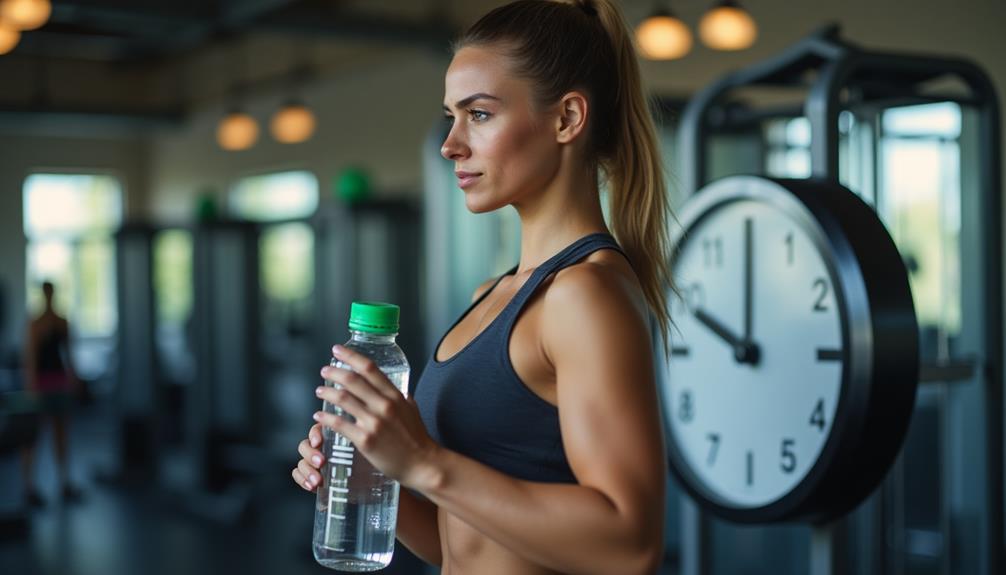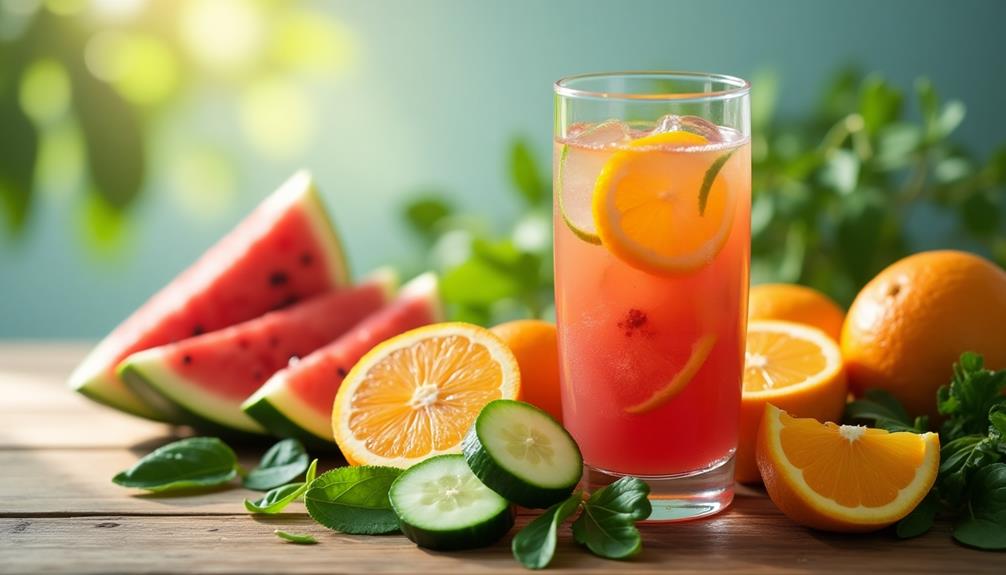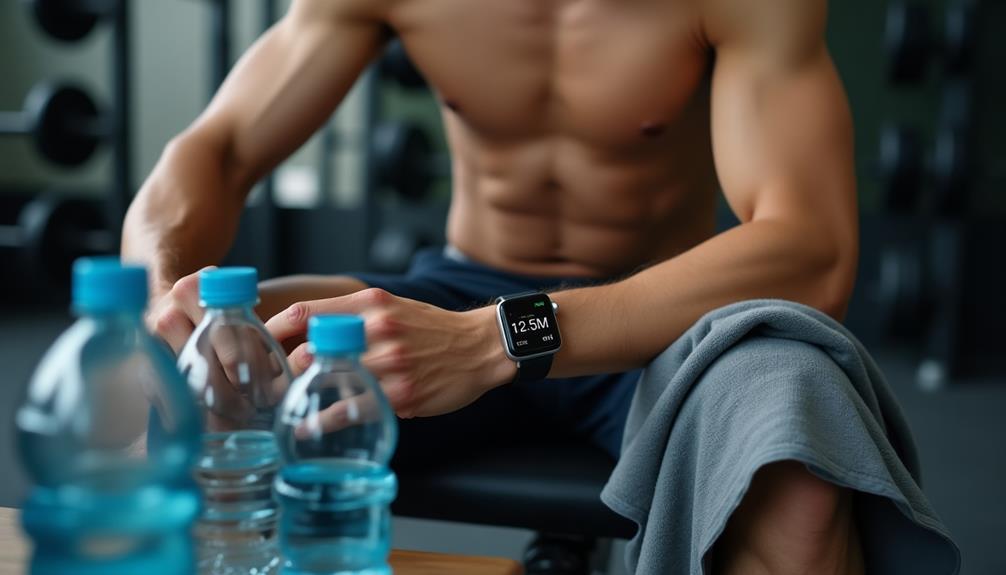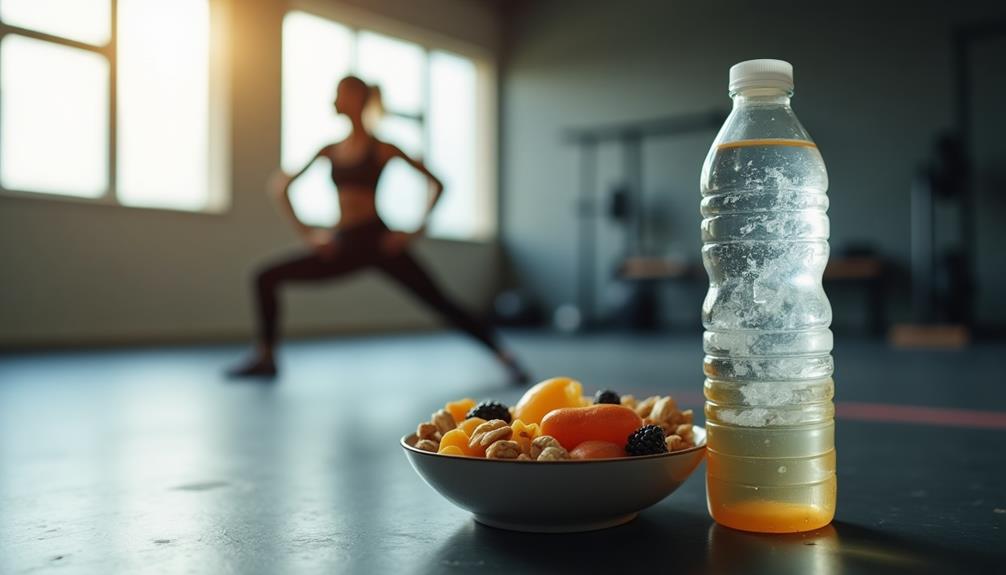To optimize muscle repair, focus on these five hydration strategies. First, understand your hydration needs; aim for at least half your body weight in ounces daily. Next, balance electrolytes by consuming foods like bananas and greens and consider electrolyte drinks after workouts. Timing matters too; hydrate at least two hours before exercise and within 30 minutes post-workout. Incorporate hydrating foods like cucumbers and watermelon to boost intake. Lastly, monitor hydration levels by checking urine color; pale yellow means you're on track. Follow these tips for better recovery and you'll uncover even more effective strategies.
Core Insights
- Stay properly hydrated by drinking at least half your body weight in ounces of water daily, adjusting for activity level and climate.
- Incorporate hydrating foods like cucumbers, watermelon, and leafy greens to enhance fluid intake and support muscle recovery.
- Consume electrolyte-rich drinks or gummies post-workout to replenish lost minerals and maintain electrolyte balance for optimal muscle function.
- Monitor urine color to assess hydration levels; pale yellow indicates good hydration, while dark yellow signals a need for more fluids.
- Hydrate consistently throughout the day, sipping water regularly and drinking within 30 minutes post-exercise to kickstart recovery.
Understand Your Hydration Needs

Understanding your hydration needs is pivotal for effective muscle repair. Proper hydration helps transport nutrients to your muscles, promoting recovery. To determine how much water you need, consider your activity level, climate, and individual body weight. Generally, aim for at least half your body weight in ounces daily. If you're exercising intensely, increase your intake to replace lost fluids. Electrolyte gummies can be a convenient option for replenishing essential minerals lost during exercise, especially for athletes and active individuals.
Pay attention to signs of dehydration, like fatigue, dizziness, or dark urine. Remember, water isn't the only option; herbal teas and broths can also contribute to your daily intake.
Timing is crucial—drink fluids before, during, and after workouts. Incorporating these hydration strategies will support your muscle recovery and enhance overall performance, helping you feel your best as you progress.
Optimize Electrolyte Balance

To enhance your electrolyte balance, start by consuming foods rich in these nutrients. Bananas, leafy greens, and nuts are excellent sources. You can also consider electrolyte-replenishing drinks, particularly after intense workouts. Comprehensive electrolyte blends like Nutricost Electrolyte Complex or Nuun Sport Tablets can provide a quick and effective way to replenish lost minerals. Look for products that offer a balanced mix of sodium, potassium, magnesium, and calcium for ideal hydration and muscle function.
Pay attention to your body's signals, like muscle cramps or fatigue, which may indicate an imbalance.
Timing Your Fluid Intake

Effective hydration is essential for muscle repair, and timing your fluid intake can make a significant difference. To maximize recovery, drink water before, during, and after your workouts. Start by hydrating at least two hours prior to exercise; this prepares your body for the demands ahead. During your workout, sip water regularly to replace fluids lost through sweat. For intense workouts, consider using electrolyte-rich powders to maintain peak hydration and performance. These powders can help replenish essential minerals like sodium, potassium, magnesium, and calcium. After exercising, replenish your body by drinking within 30 minutes to kickstart the recovery process. Aim for a mix of water and electrolyte-rich beverages post-workout to restore balance. Remember, consistent hydration throughout the day is key, too. Don't wait until you're thirsty; make fluid intake a regular part of your routine for optimal muscle repair and performance.
Incorporate Hydrating Foods

Incorporating hydrating foods into your diet can greatly enhance your muscle repair efforts. These foods not only provide essential nutrients but also help maintain hydration, which is pivotal for recovery. Including a variety of hydrating options can boost your overall intake.
Here's a handy table of hydrating foods you can easily add to your meals:
| Hydrating Food | Water Content (%) |
|---|---|
| Cucumber | 95 |
| Watermelon | 92 |
| Strawberries | 91 |
| Celery | 95 |
| Spinach | 91 |
Monitor Hydration Levels

Hydrating foods play a significant role in recovery, but keeping an eye on your hydration levels is equally important. To monitor your hydration, start by checking the color of your urine. Pale yellow indicates good hydration, while dark yellow suggests you need to drink more fluids.
Next, consider your activity level and the climate. If you're exercising or it's hot outside, you may need to increase your fluid intake. Aim for consistent hydration throughout the day, rather than waiting until you feel thirsty.
Using a water bottle with measurements can help track your intake. Additionally, pay attention to your body. Signs like fatigue, dizziness, or dry mouth can signal dehydration. By staying vigilant, you'll support your muscle repair effectively.
Frequently Asked Questions
How Do Hydration Needs Differ for Endurance vs. Strength Athletes?
Hydration needs vary greatly; endurance athletes require more fluids to replace sweat loss during prolonged activity, while strength athletes focus on hydration for recovery and performance. You'll need to adjust your intake based on your training demands.
Can Hydration Affect Muscle Soreness After Workouts?
You know how after a tough workout, your muscles can feel like they've run a marathon? Staying well-hydrated helps reduce that soreness, keeping you feeling sprightly and ready to tackle your next challenge.
What Are the Signs of Dehydration During Exercise?
During exercise, you might notice signs of dehydration like increased thirst, dry mouth, fatigue, dizziness, or dark urine. If you experience these symptoms, it's important to drink fluids and rehydrate as soon as possible.
Are There Specific Fluids to Avoid for Muscle Recovery?
You should avoid sugary drinks and excessive caffeine after workouts. These can hinder recovery and hydration. Instead, focus on water or electrolyte-rich beverages to support your body's needs and promote effective muscle repair.
How Does Caffeine Impact Hydration and Muscle Repair?
Did you know that caffeine can lead to a 1-2% increase in dehydration? While it may enhance performance, it can hinder muscle repair by affecting fluid balance. Staying hydrated is still essential for recovery.

